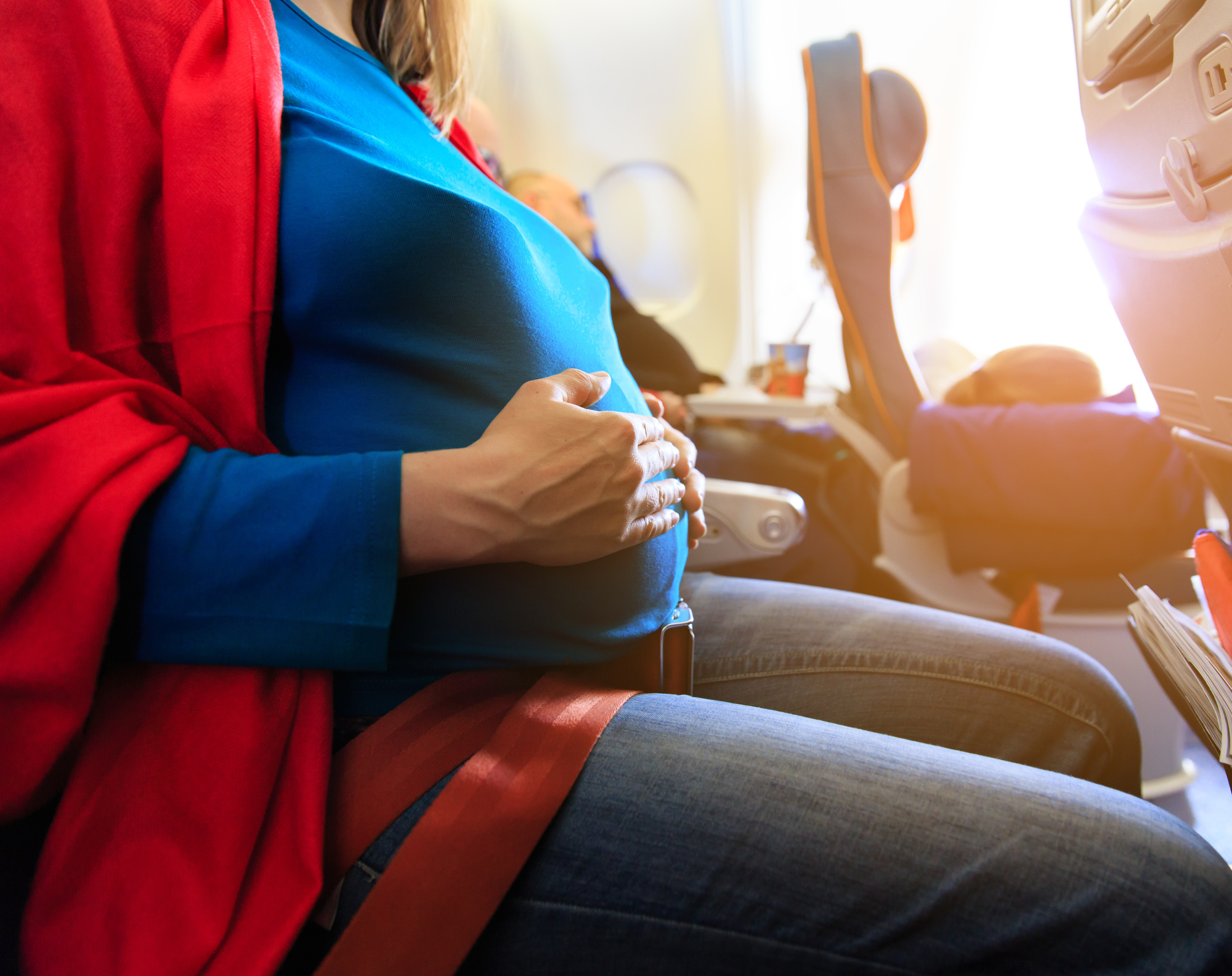
If you’re an expecting mother, it’s understandable to be worried about flying when pregnant. While flying is generally not harmful during a low-risk pregnancy, there are potential side-effects and factors to consider before taking a trip.
Before you take off, you should always consult with your midwife or doctor about any health issues or pregnancy complication to confirm it’s safe for you to fly when pregnant.
If your midwife or doctor have said you’re okay to fly, chances are you have nothing major to worry about. But just because you can fly, doesn’t mean the idea of flying when pregnant isn’t still scary. But if you follow these tips and tricks, we guarantee you’ll have a safe (and enjoyable) flight.
Tips for Flying When Pregnant
When you’re pregnant, the safest time for you to travel is during your second trimester, which is between the 18 and 24th weeks of pregnancy. This is the safest time because your risk for miscarriage and preterm labor are at their lowest.
It’s generally not advised for you to travel during your third trimester, so if you’ve planned any traveling, you should try to stick to a domestic travel destination within 300 miles of your home in case there are any sudden changes.
Tip: Check in With Your Doctor Before You Fly
Before you fly, you should ask your doctor to write you a letter giving you permission to travel, noting your due date, and detailing any pregnancy complications that a doctor at your travel destination might need to know. You should also ask your doctor the following questions:
- How should I prepare for any temperature or climate change?
- Are there any factors I should consider about flying?
- Are any special medications or vaccinations required for my trip?
- Are there any special food restrictions I should keep in mind?
- Are there any activities I should avoid?
By asking these questions you can learn the dos and don’ts of flying and traveling when pregnant.
Tip: Check in With Your Airline
Not all airlines have the same policies regarding women flying when pregnant. In fact, some airlines don’t allow more than 35 weeks pregnant to fly. So before you book your trip, you should ask the ticket agent or airline representative about what those restrictions may be.
Even if there are no restrictions, you should still contact the airline to guarantee any special service you may need to keep your comfortable on the flight. We recommend that you avoid smaller planes that fly low, and instead choose a larger plane with pressurized cabins.
You should also keep in mind you most likely won’t be able to waive any ticket change fees and penalties that are incurred.
Tip: Don’t Fly if You Have Any Pregnancy Complications
Women who are experiencing complications associated with their pregnancy are considered “high risk” and shouldn’t be flying when pregnant as they near their due date. These complications include diabetes, sickle cell disease, hypertension, and risk for premature labor.
You should also avoid air travel when you’ve had a placenta-related problem or if your doctor has advised against it based on your current state or medical history.
Tip: Pick the Right Seat
Picking the right seat for your flight can make all the difference when it comes to overall comfort. For the smoothest ride, you should request a seat in the middle of the plane over the wing. If you need more legroom, you should consider paying for an upgrade that will allow you stretch and flex your fee to minimize and prevent swelling.
Tip: Dress Comfortably
Comfort is important when you’re pregnant, especially when you’re pregnant on a plane for an extended period of time. To make your flight more comfortable, you should wear loose clothing and avoid crossing your legs. You should also wear your seat belt strap over your lower lap and keep it securely fastened just in case there is there is any turbulence during the flight.
You should also wear comfortable shoes and try to take regular walks around the plane every 30 minutes. This will aid your circulation and help lessen any risks of blood clots.
It’s also important to pack lightweight clothing you can easily layer to accommodate any changes in temperature and climate that occur when you reach your travel destination.
Tip: Pack Appropriately
Every mommy-to-be should pack a travel bag that will keep her safe, comfortable, and happy while traveling. While you should travel light and smart, you should also make sure you have the following things:
- Compression socks to promote blood circulation
- Small lumbar pillow for sleeping
- Snacks like granola and trail mix
- Anti-nausea medication
- Easy-to-wheel luggage
If you’re not sure what else to bring, check out a mommy blog for
In general, remember to pack light and avoid heavy lifting so you don’t get injured! If you’re less suited for long-distance traveling or at risk, Green Trousers has products that can make getting around easier.
Tip: Bring a Copy of Your Prenatal Records
You should always bring a copy of your prenatal records and medical notes on your flight. You should also research where the nearest hospital or medical facility is located at your travel destination. These records will help a local doctor understand the circumstances of your pregnancy if a situation arises.
You should also keep your health insurance on you at all times and remember that medical expenses abroad are generally higher. If you do require foreign medical care, make sure to keep copies of all health care receipts.
Final Thoughts on Traveling When Pregnant
Traveling can be fun, but if you’re pregnant it can be tiring and often overwhelming. If you’re traveling when pregnant, remember to take care of yourself and travel on your terms. Don’t feel guilty about bailing on activities that are exhausting, and if need be, take some time to pamper yourself on your trip.
Are you a mommy-to-be about to go on a trip? Are there any tips or tricks we missed? Let us know in the comments!
